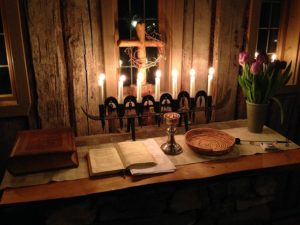The Last Supper and the Next Supper with Jesus
“This is my blood of the covenant, which is poured out for many,” [Jesus] said to them. “Truly I tell you, I will not drink again from the fruit of the vine until that day when I drink it new in the kingdom of God.”
Mark 14:24-25
 Almost all Christians remember the events of the Last Supper and reenact those events on a regular basis. Some of us call this “Communion.” Others call it the “Eucharist” or the “Lord’s Supper” or the “Mass.” But, no matter the differences in name or theological nuance, all Christians understand that the sharing of bread and the cup in a worship service is an occasion to remember what Jesus did for us on the cross. It is a time to look back so that we might be renewed and refreshed in the present.
Almost all Christians remember the events of the Last Supper and reenact those events on a regular basis. Some of us call this “Communion.” Others call it the “Eucharist” or the “Lord’s Supper” or the “Mass.” But, no matter the differences in name or theological nuance, all Christians understand that the sharing of bread and the cup in a worship service is an occasion to remember what Jesus did for us on the cross. It is a time to look back so that we might be renewed and refreshed in the present.
But, in my experience, most Christians overlook another dimension of the Last Supper in our reenactments, namely, the future dimension. After sharing the bread and cup with his disciples, Jesus said, “Truly I tell you, I will not drink again from the fruit of the vine until that day when I drink it new in the kingdom of God” (14:25). Even as he focused his attention on his imminent death, Jesus also looked beyond to the eschatological horizon when, in the fullness of the kingdom, he would share a meal with his disciples. This great feast, sometimes called the Messianic Banquet, would be a celebration of God’s triumph through Christ and an occasion for all of God’s people to gather for a meal to end all meals.
Therefore, when we share in the Lord’s Supper together, or whatever you call it, we rightly look back to the death of Jesus for us. And we rightly open our hearts to experience Jesus in the present through the bread and the cup, and through the Spirit who is present in the Sacrament. And, if we take seriously Jesus’s own words at the Last Supper, we should also look to the future in anticipation of the Messianic Banquet of the Kingdom. Our experience of Communion is an appetizer for the glorious feast that lies ahead for us, when we will eat the bread and drink the cup with Jesus.
Thus, the Eucharist is a time of thanksgiving, as we thank God for the gift of new life through the death of Jesus. (The word “Eucharist” comes from the Greek word eucharistia, which means “thanksgiving.”) And it is also a time for hope, as we remember the promise of Jesus that we will one day share this meal with him.
QUESTIONS TO CONSIDER:
When you receive Communion, do you ever think of the future with the Lord? Why or why not?
How might a past/present/future sense of the Lord’s Supper make a difference in your life?
When you imagine eating supper with Jesus, what comes to mind? What thoughts? What feelings? What hopes?
PRAYER:
Lord Jesus, thank you for giving to your church the gift of your supper. Though we call it different things and emphasize different aspects of it’s meaning, this supper brings us together in memory of you and your death for us.
Yet, as we take seriously your words, we are also encouraged to think ahead, to that day when we will share the Messianic Banquet with you. What a day that will be!
May this hope sustain us when we are tired. May it inspire our worship and empower our mission. May it fill every part of our lives. May it bind us together as people of promise.
All praise be to you, Jesus, Lord of past, present, and future. Amen.
Explore more at the Theology of Work Project online Bible commentary: Future in the Lord’s Supper

Mark D. Roberts
Senior Fellow
Dr. Mark D. Roberts is a Senior Fellow for Fuller’s Max De Pree Center for Leadership, where he focuses on the spiritual development and thriving of leaders. He is the principal writer of the daily devotional, Life for Leaders, and t...


